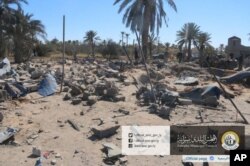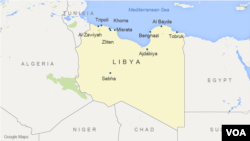Immediate international action against Islamic State extremists in Libya is needed to prevent the terrorist group from expanding further, regardless of the status of peace talks on a unity government there, analysts say.
“Putting pressure on those political entities so far has not yielded any positive outcome,” said Kamel Wazne, the director of the Center for American Strategic Studies in Beirut. “And I think at least you have to start to weaken these terrorist organizations.”
He said the global community’s failure to fight IS in Libya is helping the group expand beyond its strongholds there as well as in Syria and Iraq.
Tunisia’s closure of its frontier with Libya after a border town battle that killed 55 people has added to the pressure on Libya's two competing governments, analysts like Wazne say.
Post-Gaddafi chaos
Libya has been in chaos since Moammar Gaddafi was toppled five years ago. Along with the two rival governments, several militant and extremist groups like IS are operating in the country.
Diplomats say the Libyan factions need to unite to overcome IS militants, but multiple rounds of peace talks have collapsed.
The militant group appears to be growing stronger, attacking border town Ben Guerdane in Tunisia. About 50 gunmen battled Tunisian forces before the town was secured Monday, leaving civilians, security forces and attackers dead and wounded.
No group claimed responsibility, but the attack resembled previous attempts by Islamic State militants to widen their control over civilian areas.
Tunisian President Beji Caid Essebsi said the “unprecedented” attack was coordinated and organized with the aim of taking control of the region.
“[Security forces] were expecting such an operation,” he said in Algeria on Monday. “Not on this scale, but still they were expecting it.”
Peace talks
Western insistence on successful United Nations-sanctioned peace talks a the single path to form a united front against IS could be simultaneously wearing away at other potential solutions while giving IS the time and space to grow, according to Jason Pack, a researcher of Libyan history at Cambridge University.
“Continued Western attempts to force a square peg into a round hole threaten to destroy many of the new aspects of Libyan unity that seem to be emerging,” he writes in Middle East Eye, an online news organization. “Paradoxically, these attempts are clearly undermining the initial geopolitical purpose of the unity government - to facilitate the conducting of joint actions against the Islamic State [IS] militant group.”
Western leaders say if they attempt to intervene in Libya without a unified government with which to ally, any military action is bound to fail.
“Italy is a leading country on this issue but the priority is to form a government in Libya,” said Italian Prime Minister Matteo Renzi last week. “Before a mission all attempts must be made to form a government."
On Friday, two Italian construction workers escaped captivity in Libya, leaving behind two hostages they said IS killed.
The U.S. ambassador to Italy responded by saying Rome is willing to commit 5,000 troops to its former colony if the two Libyan governments unify, but the Italian prime minister says that idea “is not on the table.”
Growing threat
And with only bad choices available in countering the extremist threat, it continues to grow as Western countries chose inaction over what could be a failed action.
“Every day we delay an attack on these terrorists,” says Wazne, “We give them more time to build their infrastructure and to be more formidable.”








